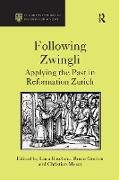Read more
During the sixteenth-century reform movement, Zwingli and his humanist colleagues in Zurich sought biblical, historical, literary, and political models to shape and defend their radical reforms. This book explores history, scholarship, and memory and examines the immediacy of antiquity, early Christianity, and the Middle Ages for the Zurich reforme
List of contents
Chapter 1 Emulating the Past and Creating the Present: Reformation and the Use of Historical and Theological Models in Zurich in the Sixteenth Century, Bruce Gordon, Luca Baschera, Christian Moser; Chapter 2 Patristics and Polemic: Josias Simler’s History of Early Church Christological Disputes, Mark Taplin; Chapter 3 Bullinger’s Model for Collective Episcopacy: Transformational Ministry in a Society Facing Final Judgment, Jon Delmas Wood; Chapter 4 Peter Martyr Vermigli’s Epistle to the Princess Elizabeth : Models of Redemptive Kingship, Torrance Kirby; Chapter 5 A Mirror of Virtue: Commentaries on the Book of Ruth in Sixteenth-century Zurich, Christian Moser; Chapter 6 Reforming a Model: Zwingli, Bullinger, and the Virgin Mary in Sixteenth-century Zurich, Rebecca A. Giselbrecht; Chapter 7 The Childhood of Christ as a Model of Christian Child Raising: Two Sermons of 1553 by Rudolf Gwalther, Kurt Jakob Rüetschi; Chapter 8 Moral Treatment of Immoral Texts from Classical Antiquity: Conrad Gessner’s Martial-Edition of 1544, Urs B. Leu; Chapter 9 Shaping Reformed Aristotelianism: Otto Werdmüller’s Evaluation of the Nicomachean Ethics in De dignitate, usu et methodo philosophiae moralis (1545), Luca Baschera; Chapter 10 ‘Praeceptor amicissimus’: Konrad Pellikan, and Models of Teacher, Student and the Ideal of Scholarship, Matthew McLean; Chapter 11 Fathers and Sons: the Exemplary Lives of Konrad Pellikan and Leo Jud in Reformation Zurich, Bruce Gordon;
About the author
Luca Baschera, Universität Zürich, Switzerland; Bruce Gordon, Yale University, USA and Christian Moser, Universität Zürich, Switzerland.
Summary
During the sixteenth-century reform movement, Zwingli and his humanist colleagues in Zurich sought biblical, historical, literary, and political models to shape and defend their radical reforms. This book explores history, scholarship, and memory and examines the immediacy of antiquity, early Christianity, and the Middle Ages for the Zurich reforme

